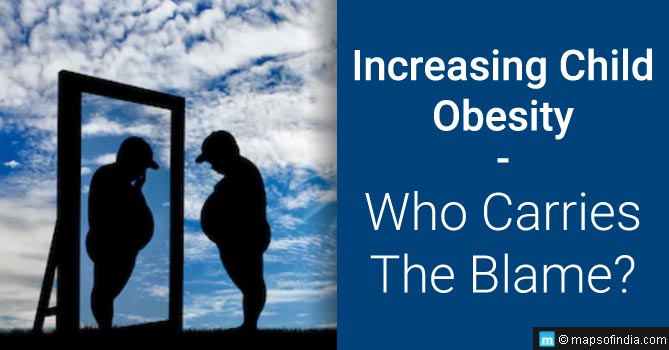हिंदी में पढ़ने के लिए यहां क्लिक करें
According to a 2017 study by the New England Journal of Medicine, India has the second highest number of obese children in the world, coming only behind China. While globally, over two billion children and adults fall under the category of being “obese”, the number of obese children in India was a shocking 14.4 million. Another study conducted in South India showed the number of over-weight children has increased to 6.57% in 2005, from an earlier 4.94% in 2013.
The results combined together are alarming. The increasing rates of obesity in developing nations have been worrisome, and same is the case with India. The question is, why is this problem strengthening its hold, and on an individual level – who is to be blamed?
Major causes of child obesity
The first thing to be understood is that being overweight and being obese are two different things. While both should be considered seriously, obesity poses a much greater risk. If excess weight (the state of being overweight) is not controlled in time, it can potentially lead to obesity.
What causes obesity?
In some cases, it can be hereditary and running down in generations. However, in other cases, it is a result of multiple external factors, including a person’s lifestyle. The increasing instances of obese children in India coincided with a changing pattern of upbringing. These days, parenthood has taken a giant leap – both forwards and backward. While many facilities are available to nurture a child well, like Pediatricians, daycare centers, not every change is positive.
Kids spend a major portion of their day with technology, be it mobile phones, laptops etc. Consequently, they spend less and fewer hours on outdoor activities, as compared to before. Studies show that excessive TV watching can not only lead to disruptive sleeping patterns but also induce unhealthy eating habits. Eating out, or watching TV while eating is known to lead to a larger intake of fat. Speaking of eating habits, in the present day scenario, the popularity of fast food is increasing. While children are known to copy the behavior of their parents, parents these days are also, knowingly or unknowingly, encouraging fast food consumption. Going out for dinner, ordering in etc are quickly becoming a popular norm, given the busy schedule. An average Indian child is more likely to have an unhealthy food plate in today’s world, than before.
Can schools also be blamed?
Children spend an average of 5-6 hours in their schools every day. Hence naturally, a large part of their lifestyle is shaped and determined by the educational institution.
Sports: Sports activities are a very crucial way of building a healthy life for children, as well as to prevent obesity. Unfortunately, Indian schools do little or nothing to encourage students to engage in sports. Emphasizing on the need for sports, Central Board of Secondary Education (CBSE) mandated a daily sports period for its schools in April, 2018.
Junk food in canteens: When in school, children usually make use of the canteen for snacks, and sometimes also for their entire lunch. However, you will rarely find healthy food items like fruits on the shelves. Packaged food, caffeinated beverages, chocolates etc are the highlights of an average school canteen, and hence become a daily meal for many students. This leads to a further increased risk of being overweight and obese.
Why is child obesity an alarming threat on our heads?
Physical health: While being overweight exposes you to risks like depression, high blood pressure etc, being obese puts you in the line of fire for several more health complications. People with obesity are more likely to experience hypertension, diabetes, asthma, and even heart diseases. Obese children have high probabilities of staying obese as adults too.
Mental Health and emotional wellbeing: Depression can be a cause as well as a result of obesity. Being overweight or obese can also lead to decreased confidence and lower self-esteem. Some children end up distancing themselves from surroundings, becoming the silent face in a corner.
What can be done?
As a parent: Parents are called the first teacher of any child, and truly so. Children have a strong inclination towards copying and adapting from their surroundings, and parents are the very first people they start adopting from. Accordingly, as a parent, one should make the household as healthy as possible. Minimizing the consumption of fast food, encouraging their child to eat healthy snacks, fruits etc is an effective way to make sure obesity doesn’t enter the picture. It is easier to incorporate habits into a person if they are taught at a young age. Hence, parents can build up the habit of routine exercise into their child.
As school authorities: Schools need to lay emphasis on an overall well-being of their students, not merely the academics. Accordingly, a compulsory sports period, regular sports tournaments etc should be made an integral part of the education system. Giving attractive incentives to students for participating in sports and outdoor activities can encourage more participation.
Moreover, the school canteens can be reshaped to give way to more healthy food components and doing away with unhealthy food at the same time.
Regular Body Mass Index (BMI) checkups, at home as well as at school, can lead to a much better health of children and eliminate the risk of obesity.
Children are rightly called the future of a nation, as well as its pillars of strength. Their sound health is of utmost importance and needs to be taken care of more seriously in the country.






